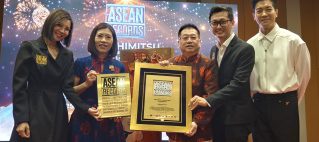Nanjing Dajing Que Tang Yu Fang Health Technology has officially announced its expansion into the overseas market with the opening of ASEAN’s first AI-powered health and wellness tea store at Pavilion Bukit Jalil, Kuala Lumpur. The store will be fully managed and operated by Malaysia’s master franchisee, Dajing TCM Sdn. Bhd.
The grand opening ceremony was held with great fanfare, attended by industry leaders, wellness advocates, and business stakeholders. Representing Malaysia, Dr. Davis Wong, CEO of Dajing TCM, received the ASEAN Records certificate, while 杨礎祎 (Yang Chu Yi), Regional Deputy General Manager from China, also joined the celebration to received this historic milestone. The event was also graced by Ungku Raad Azeraai Bin Ungku Mohd Najib, CEO of Southern Dagang (南方达洋集团首席执行官), who served as a distinguished witness.

ASEAN Records Recognition
At the launch, Que Tang Yu Fang was officially recognised by ASEAN Records for achieving: “First TCM Café Chain to Integrate AI Health Screening for Real-Time Diagnosis and Herbal Drink Recommendations from Patented TCM Formulas.”
This distinction highlights the brand’s pioneering position in merging traditional Chinese medicine wisdom with cutting-edge artificial intelligence, setting a new benchmark in the health-tech and functional beverage industry across the ASEAN region.
AI Empowering Traditional Wellness
The key innovation behind Que Tang Yu Fang lies in its AI Tongue Analysis Device and AI Pulse Diagnosis Device, which simulate TCM’s four key diagnostic pillars: inspection, listening, inquiry, and palpation. By combining these diagnostic methods with lifestyle data, the system provides a real-time health assessment and recommends personalised herbal teas from patented formulas — embodying the principle of “one cup, one extraction.”
Every drink is freshly brewed daily with rock sugar and licorice root, balancing flavour, authenticity, and therapeutic efficacy.

A New Chapter in Global Expansion
Launched in Nanjing in 2024, the first “Digital TCM + Wellness Tea” concept store has now evolved into an international expansion movement. Malaysia represents the brand’s first overseas step, strategically chosen as a hub for ASEAN.

said Dr. Davis Wong, CEO of Dajing TCM Malaysia. “Malaysia, as a key market in ASEAN, is an important first step in our global expansion journey.”

From headquarters in China, Miss Yang ChuYi, General Manager of Que Tang Yu Fang, emphasized:

“The successful launch of our 1st store in Pavilion Bukit Jalil is a strategic starting point for our global expansion. We will continue to export R&D, technology, and brand standards from China, ensuring innovation and consistency across all outlets. Our vision is to build a global health and wellness tea chain rooted in TCM wisdom — where a cup of wellness tea in every hand becomes a worldwide lifestyle.”

Entry into ASEAN Records Hall of Recognition
With this recognition, Que Tang Yu Fang officially enters the ASEAN Records Hall of Recognition, joining a distinguished list of enterprises that have reshaped industries through innovation and cultural heritage.
This milestone not only demonstrates Malaysia’s role in leading AI-powered wellness innovation, but also signals a transformative chapter in the globalisation of Traditional Chinese Medicine.






